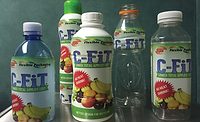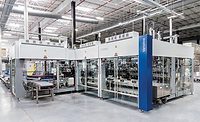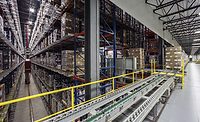Shrink and stretch wrappers optimize efficiency, protection
Suppliers release new equipment to provide higher throughput

As beverage warehouses take on more SKUs and distribution centers consolidate, single-source centers must be equipped to handle high throughputs and mixed pallet scenarios. In turn, stretch wrapping equipment must ensure the product’s integrity.
Covering these types of supply chain challenges is all in a day’s work for Signode Industrial Group, according to Joe Albert, vice president of sales and marketing for global wrapping technologies for the Glenview, Ill.-based company.
“What remains constant is the need for reliable, safe and efficient transport that ensures brands are protected throughout their journey,” Albert says. “For the beverage industry, a single case of beer or soda will travel thousands of road miles and within multiple facilities (i.e., manufacturing facility, distribution centers, retail store, etc.) A poorly secured pallet load can easily result in irreversible product damage whereby the product and upstream value investment are now lost.”
To optimize efficiencies throughout the supply chain, Signode offers its Octopus line of rotary ring stretch wrappers designed to cover a wide spectrum of needs and to meet diverse throughput and load-containment demands.
“[We’re] also improving film usage and overall consumables waste/cost,” Albert says. “One of the virtues of working for a large multinational corporation with decades of experience is that our ongoing innovation in terms of equipment and materials — and how they optimally interact — is larger and more important than any particular trend.”
In May, Signode unveiled its redesigned Octopus Compact 20/Compact TSI series that provides optimal load containment while optimizing film usage in space-limited warehouses and distribution centers.
A cost-effective and reduced-footprint solution, “the new Octopus Compact 20/Compact TSI series enables bottom-to-top or top-to-bottom automatic rotary ring stretch wrapping,” Albert says.
“It wraps up to 40 loads per hour depending on load size and wrap pattern … and comes fully equipped with Muller’s patented Easy S Film Carriage, which enables simple film loading, maximizes pre-stretch performance and minimizes wear,” Albert explains.
At the opposite end of the Octopus spectrum is the high speed, high capacity Octopus “T,” which can wrap as many as 150 loads an hour, Albert says. Equipped with a double film carriage and a seaming unit solution, both film carriages simultaneously and independently apply film. In addition, beverage-makers can utilize an optional Fast Cycle conveyor solution to cut traditional conveying time in half, he adds.
To keep beverage operations humming along, Alexandria, Minn.-based Orion, a division of ProMach, manufactures rugged and reliable stretch wrapping machines. Depending on the product and pallet wrapping needs, the company offers semi-automatic and fully automatic models in turntable, rotary tower and orbital configurations, the company’s website states.
For instance, the Rotary Tower Automatic (RTA) automatic stretch wrapping system boosts end-of-line packaging efficiency as it eliminates the need for operators to manually attach the film tail to the load, then cut and secure the film tail at the end of the cycle.
Driving innovation
To differentiate themselves, some craft brewers are using the outer stretch wrap as a canvas to market their products and drive sales.
For instance, Midland, Mich.-based Dow Packaging and Specialty Plastics, a business unit of The Dow Chemical Co., is collaborating with craft beer brewer Oskar Blues, a part of the CANarchy Craft Brewery Collective, along with plastics converter Berry Global and Ampacet to produce printed collation shrink packaging for the brewer’s 24-can variety cases.
In addition to marketing and sustainability motivators, the rise of eCommerce and the “new normal” to have packages wrapped and delivered within a few days is facilitating a more rapid adoption of stretch wrappers, Signode’s Albert says.
“It’s less a question of redesign but of more rapid market adoption, particularly in North America, where we introduced our unique tray packaging solution that incorporates our H. Böhl automatic orbital stretch wrapper and Loveshaw Little David Case Sealer SP-304 to improve product integrity and increase sustainability with greater packaging efficiency,” Albert says.
Advancing automation
Experts note that technological advancements in shrink and stretch wrapping equipment is evolving as trends in the beverage industry drive suppliers to manufacture new equipment to meet higher automation and throughput demands.
For example, in more sensitive applications, like dairy or other cold-storage scenarios, where stretch wrap might suffocate products, Glenview, Ill.-based Signode Industrial Group is developing varying methods for automatically applying film to the load so that it provides proper ventilation while ensuring optimal pallet protection, according to Joe Albert, Signode’s vice president of sales and marketing for global wrapping technologies.
To keep pace with large multinational beverage manufacturers, Albert suggests that technological advancements for stretch wrappers must be global in nature particularly because beverage-makers require machines whose data centrally can be communicated and monitored across multiple worldwide plants.
To differentiate themselves, some craft brewers are using the outer stretch wrap as a canvas to market their products and drive sales. For instance, Midland, Mich.-based Dow Packaging and Specialty Plastics, a business unit of The Dow Chemical Co., is collaborating with craft beer brewer Oskar Blues, a part of the CANarchy Craft Brewery Collective, along with plastics converter Berry Global and Ampacet to produce printed collation shrink packaging for the brewer’s 24-can variety cases.
The brand’s new packaging has generated a 40 percent cost savings, a 64 percent reduction in secondary packaging materials usage and 73 percent fewer trucks delivering packaging materials to Oskar Blues, the company says.
Automation, speed, high throughput and shrink and stretch wrap equipment that can equally produce and communicate worldwide will be integral tools now and in the future, experts note. “Automation will continue to proliferate all facets of the manufacturing environment, especially in high throughput industries like beverage,” Albert says. “In addition, greater consolidation and more vertically oriented warehouses will increase material handling requirements and challenges.
“Stretch wrap solutions will need to evolve with increasing demand,” he continues. “Equipment will likely continue to become faster and more flexible. One challenge for equipment manufacturers will be to look for greater ways to optimize its floor footprint. In the future, we will likely see more robust machines fitting in tighter spaces.” BI
Looking for a reprint of this article?
From high-res PDFs to custom plaques, order your copy today!






